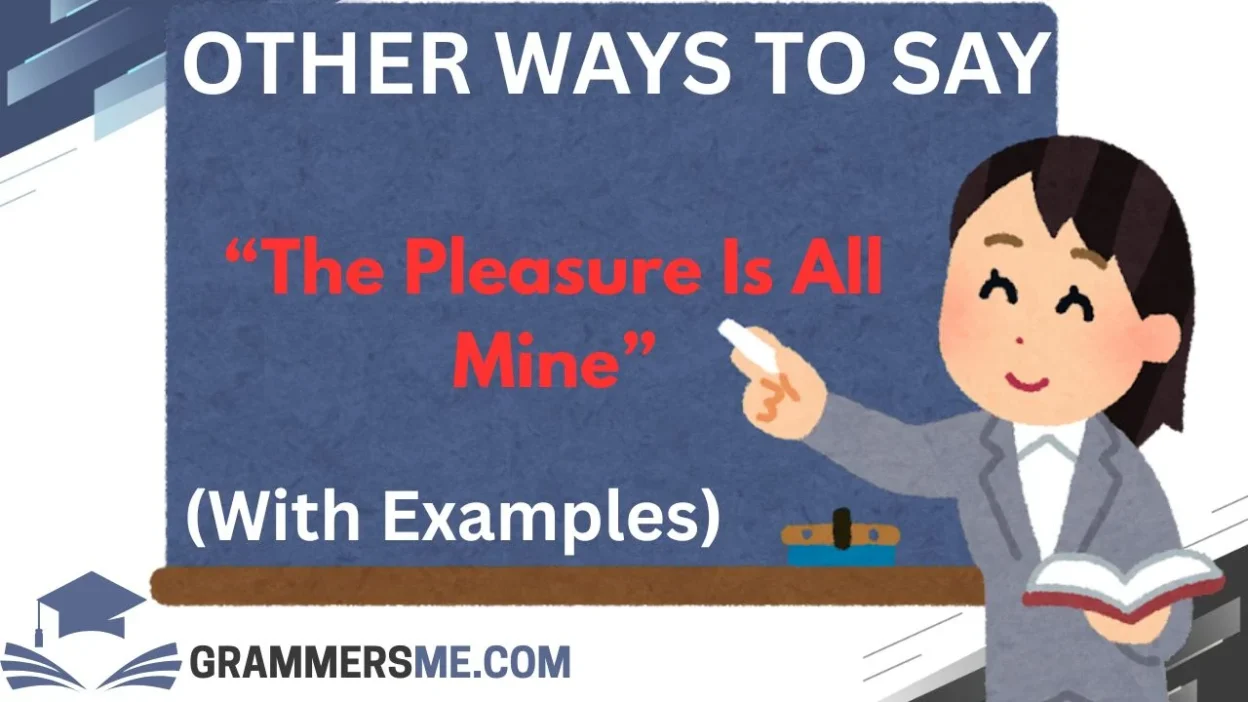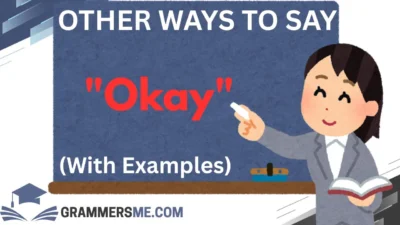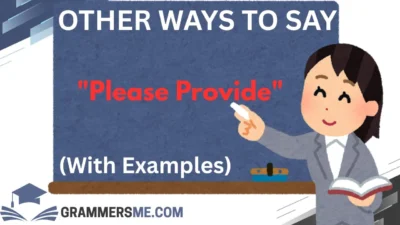In communication, words hold the power to transform ordinary moments into heartfelt exchanges. The way we express gratitude, warmth, and kindness can leave lasting impressions, especially when we can communicate our appreciation in thoughtful, engaging ways. “The pleasure is all mine” is a beautiful expression, but there are many alternatives that can make your message feel even more personal and meaningful.
Whether you’re speaking to a friend, a colleague, or someone you’ve just met, these alternatives can help you express warmth, care, and sincerity in a way that feels natural and genuine.
What Does “The Pleasure Is All Mine” Mean?
“The pleasure is all mine” is a gracious, polite way of saying you are happy to meet someone or engage in an interaction. It’s commonly used after someone expresses thanks or appreciation, to convey that you are just as happy or grateful for the encounter or the opportunity as they are.
Is It Professional/Polite to Say “The Pleasure Is All Mine”?
Yes, “The pleasure is all mine” is considered polite and professional, particularly in formal settings. It strikes a balance between warmth and professionalism, making it suitable for both business and personal interactions. However, in more casual settings, people might opt for more relaxed alternatives, depending on the tone of the conversation.
1. “The Joy Is Mine”
- Meaning: A way of expressing that you’re equally delighted by the interaction.
- Explanation: This phrase carries a slightly more cheerful tone than “The pleasure is all mine,” emphasizing the joy you feel.
- Scenario Examples: After a delightful lunch with a new acquaintance, you might say, “The joy is mine,” when they thank you for your time.
- Best Use: Casual, friendly exchanges where you want to convey extra warmth.
- Not Use: In overly formal settings, where more reserved phrases are expected.
2. “I’m Truly Honored”
- Meaning: Expressing a deeper sense of respect and humility in response to gratitude.
- Explanation: This phrase conveys that you feel privileged or fortunate to have had the interaction.
- Scenario Examples: When someone thanks you for helping them, you might say, “I’m truly honored to assist.”
- Best Use: Formal occasions or when you want to express respect or admiration.
- Not Use: Casual or everyday conversations, as it may sound too formal.
3. “The Delight Is All Mine”
- Meaning: A phrase expressing that you feel great pleasure or delight.
- Explanation: This alternative has a slightly more joyful undertone than “The pleasure is all mine.”
- Scenario Examples: After a wonderful evening spent with friends, you might say, “The delight is all mine,” as a way to share how enjoyable the experience was.
- Best Use: When you’re genuinely enjoying the moment, and want to share that joy.
- Not Use: In very formal business interactions, as it can sound too informal.
4. “It’s My Privilege”
- Meaning: A respectful expression indicating that you feel fortunate to be part of the exchange.
- Explanation: This alternative is used when you want to express that you’re honored by the interaction or opportunity.
- Scenario Examples: If you’re speaking to a mentor or someone you admire, you might say, “It’s my privilege to help.”
- Best Use: Formal or professional situations where respect and formality are important.
- Not Use: In casual, relaxed conversations where the tone is lighter.
5. “I’m Happy to Have Been a Part of This”
- Meaning: Emphasizes your happiness in participating in the interaction or event.
- Explanation: This phrase communicates that you’re not only grateful but also happy to have contributed in some way.
- Scenario Examples: After a successful collaborative project, you might say, “I’m happy to have been a part of this” to show your enjoyment of the teamwork.
- Best Use: Collaborative or group settings where you want to show appreciation for being included.
- Not Use: When interacting with someone in a one-on-one setting where a more personal phrase is preferred.
6. “It’s a True Pleasure”
- Meaning: A straightforward way to convey that you’re truly enjoying the interaction.
- Explanation: Slightly more formal than “the pleasure is all mine,” this expression shows a deep, personal satisfaction.
- Scenario Examples: After someone thanks you for your help, you might respond with, “It’s a true pleasure,” showing that you’re genuinely pleased to assist.
- Best Use: Professional interactions where you want to communicate sincere enjoyment.
- Not Use: In overly casual or informal settings, as it can come across as too formal.
7. “The Honor Is Mine”
- Meaning: You feel privileged to have had the opportunity or the interaction.
- Explanation: This expression emphasizes respect and acknowledges the significance of the experience.
- Scenario Examples: After a keynote speech or presentation, you might say, “The honor is mine” to express gratitude for the opportunity.
- Best Use: Formal events or professional settings.
- Not Use: In casual social settings, as it may sound out of place.
8. “It’s Been a Pleasure”
- Meaning: A simple, timeless alternative that conveys satisfaction with the interaction.
- Explanation: This phrase is often used when parting ways with someone or after an event.
- Scenario Examples: After a friendly conversation or a professional meeting, you might say, “It’s been a pleasure” as a polite and warm sign-off.
- Best Use: Casual and formal conversations, particularly when concluding an interaction.
- Not Use: If you haven’t enjoyed the interaction, as it may seem insincere.
9. “I’m Grateful for the Opportunity”
- Meaning: This phrase conveys gratitude for the chance to interact or assist.
- Explanation: It expresses thanks for the opportunity, emphasizing how much you appreciate it.
- Scenario Examples: If someone thanks you for your help, you might respond with, “I’m grateful for the opportunity to assist.”
- Best Use: Professional settings, especially when you’re acknowledging a unique or valuable experience.
- Not Use: In casual or very informal situations, as it might sound overly formal.
10. “I’m Glad We Could Meet”
- Meaning: A warm way of expressing that you’re pleased to have had the opportunity to meet someone.
- Explanation: This expression is commonly used when meeting someone for the first time or after a pleasant conversation.
- Scenario Examples: After a first meeting, you might say, “I’m glad we could meet” to convey appreciation for the interaction.
- Best Use: Ideal for first-time meetings or encounters.
- Not Use: After someone expresses deep thanks, as it might seem like you’re downplaying their gratitude.
11. “It Was My Absolute Pleasure”
- Meaning: A more enthusiastic way of saying you genuinely enjoyed the interaction.
- Explanation: Adding “absolute” emphasizes sincerity and warmth, making this phrase sound even more heartfelt.
- Scenario Examples: If a friend thanks you for hosting a dinner, you might say, “It was my absolute pleasure to have you over!”
- Best Use: When you want to sound extra warm and enthusiastic, especially in personal conversations.
- Not Use: In extremely formal settings where a simpler response like “It was my pleasure” might be more appropriate.
12. “I Was Happy to Help”
- Meaning: A straightforward way of expressing that you were glad to assist.
- Explanation: This phrase works well when responding to gratitude, reinforcing that helping was not a burden but a joy.
- Scenario Examples: If a colleague thanks you for assisting with a project, you can say, “I was happy to help anytime!”
- Best Use: When responding to someone thanking you for your help.
- Not Use: When the situation doesn’t involve assistance, such as meeting someone for the first time.
13. “It’s Been a Delight”
- Meaning: A softer, more graceful way of saying you enjoyed the moment.
- Explanation: Similar to “It’s been a pleasure,” but adds a touch of elegance and warmth.
- Scenario Examples: After a lovely event, you might say, “It’s been a delight getting to know you.”
- Best Use: Ideal for social gatherings and networking events.
- Not Use: When you need a more professional or formal response.
14. “The Enjoyment Was Mine”
- Meaning: A refined way of saying you thoroughly enjoyed the interaction.
- Explanation: This phrase slightly shifts the focus to emphasize the speaker’s personal joy.
- Scenario Examples: After a great client meeting, you might say, “The enjoyment was mine; I truly appreciated our discussion.”
- Best Use: Perfect for both formal and semi-formal conversations.
- Not Use: In everyday casual chats where a simpler phrase would suffice.
15. “I’m So Glad We Had This Time Together”
- Meaning: Expresses appreciation for the shared experience.
- Explanation: This phrase feels warm and personal, making it perfect for meaningful conversations.
- Scenario Examples: If a friend expresses gratitude for spending time with you, you might say, “I’m so glad we had this time together too.”
- Best Use: Personal conversations with friends, family, or colleagues you have a strong connection with.
- Not Use: When responding to quick or impersonal interactions.
16. “I Feel Honored”
- Meaning: Shows deep gratitude and appreciation for the opportunity.
- Explanation: “I feel honored” conveys that you regard the interaction or experience as meaningful and special.
- Scenario Examples: If a mentor thanks you for your contributions, you could say, “I feel honored to have been part of this.”
- Best Use: Formal or professional situations, or when responding to deep gratitude.
- Not Use: In casual situations where a more relaxed phrase would work better.
17. “I’m Thankful for This Opportunity”
- Meaning: Expresses gratitude for being part of the interaction or experience.
- Explanation: This phrase is more about thankfulness than pleasure but still conveys appreciation.
- Scenario Examples: If a team leader thanks you for your hard work, you could reply, “I’m thankful for this opportunity and happy to contribute.”
- Best Use: Formal and professional settings.
- Not Use: In casual conversations where a simpler phrase might fit better.
18. “No, Thank You!”
- Meaning: Flips the gratitude back to the other person in an appreciative way.
- Explanation: Sometimes, instead of saying “The pleasure is all mine,” you can emphasize your gratitude instead.
- Scenario Examples: If someone thanks you for your help, you could respond with, “No, thank you for trusting me with this!”
- Best Use: Everyday conversations, casual and professional settings.
- Not Use: In extremely formal situations where a more polished response is expected.
19. “I Enjoyed Every Moment”
- Meaning: Expresses deep appreciation for the shared experience.
- Explanation: This phrase adds a personal touch and emphasizes how much you valued the interaction.
- Scenario Examples: After a dinner with close friends, you could say, “I enjoyed every moment; we should do this again soon!”
- Best Use: Warm, heartfelt moments with friends or colleagues.
- Not Use: In very formal business settings where a more reserved phrase is appropriate.
20. “It’s Always a Joy”
- Meaning: Expresses consistent pleasure in interactions.
- Explanation: This phrase works well when you want to show enthusiasm for ongoing relationships.
- Scenario Examples: If a colleague thanks you for your input in a meeting, you might say, “It’s always a joy to work with you.”
- Best Use: Ongoing professional and personal relationships.
- Not Use: When meeting someone for the first time.
21. “It’s My Pleasure, Truly”
- Meaning: A more emphatic way of saying that the pleasure is truly yours.
- Explanation: By adding “truly,” you emphasize your genuine enjoyment of the interaction.
- Scenario Examples: If someone thanks you for a favor, you might reply, “It’s my pleasure, truly!” to reinforce that you’re happy to have helped.
- Best Use: Ideal for professional settings, but it can also work in casual conversations when you want to show sincere appreciation.
- Not Use: In overly formal situations where a simple response like “It’s my pleasure” would be more fitting.
22. “I Wouldn’t Have It Any Other Way”
- Meaning: This shows you’re fully content with the experience and wouldn’t want it to be different.
- Explanation: This phrase conveys that you’re not only happy but would choose this experience again without hesitation.
- Scenario Examples: After a great dinner with friends, you could say, “I wouldn’t have it any other way; this was fantastic!”
- Best Use: Casual to semi-formal settings where you’re expressing genuine joy.
- Not Use: In highly formal business interactions, as it can sound too casual.
23. “The Privilege Is Mine”
- Meaning: A formal and respectful way of expressing that you feel honored.
- Explanation: By using “privilege,” this phrase suggests you deeply appreciate the opportunity or interaction.
- Scenario Examples: If you’ve been given an important task or have worked with someone esteemed, you could say, “The privilege is mine.”
- Best Use: Perfect for professional and formal interactions.
- Not Use: In informal settings, as it may sound too stiff or distant.
24. “Anytime, It Was Wonderful”
- Meaning: A casual, warm expression indicating you would be happy to repeat the experience.
- Explanation: This phrase conveys that the time spent together was pleasant and you’d be happy to do it again.
- Scenario Examples: After helping a friend move, you might say, “Anytime, it was wonderful to help out!”
- Best Use: Casual, friendly exchanges where you want to show genuine pleasure.
- Not Use: In professional settings, where a more polished phrase would be more suitable.
25. “Nothing But a Pleasure”
- Meaning: A more relaxed, contemporary way of saying you were happy to be involved.
- Explanation: The phrase suggests that there was absolutely nothing unpleasant about the experience and that you thoroughly enjoyed it.
- Scenario Examples: After assisting someone in their work, you could say, “Nothing but a pleasure; I enjoyed helping.”
- Best Use: Informal conversations with friends, colleagues, or acquaintances.
- Not Use: In highly formal or professional situations, as it might sound too casual.
26. “An Absolute Privilege”
- Meaning: This phrase emphasizes deep respect and honor for the experience or interaction.
- Explanation: “Absolute” makes this phrase sound particularly refined, showing high regard and appreciation.
- Scenario Examples: If you’ve been part of a high-level meeting or had the chance to work with a notable individual, you might say, “An absolute privilege to be a part of this.”
- Best Use: In formal, respectful contexts where you want to emphasize honor.
- Not Use: In relaxed or casual conversations, as it could sound overly formal.
27. “It’s a Real Treat”
- Meaning: A lighthearted and playful way to express that you thoroughly enjoyed the interaction.
- Explanation: This phrase conveys enjoyment with a touch of fun and warmth.
- Scenario Examples: After a fun weekend getaway with friends, you might say, “It’s a real treat to spend time together!”
- Best Use: Casual conversations with close friends or family, or in situations that call for a more informal tone.
- Not Use: In formal settings where more polished language is expected.
28. “Couldn’t Have Enjoyed It More”
- Meaning: An enthusiastic way to convey that you couldn’t have had a better experience.
- Explanation: This phrase highlights how much you enjoyed the time or experience, making it sound enthusiastic and genuine.
- Scenario Examples: After a day out with colleagues, you might say, “I couldn’t have enjoyed it more, thanks for the great time!”
- Best Use: Casual to semi-formal settings, particularly when you’re expressing excitement and enjoyment.
- Not Use: In formal business settings, where a more restrained response would be more fitting.
29. “Happy to Have Been Here”
- Meaning: A more personal way of expressing that you’re glad you were part of the experience.
- Explanation: This phrase can be used to express appreciation for an event or interaction, emphasizing that you were happy to participate.
- Scenario Examples: After a company retreat or social gathering, you might say, “Happy to have been here, this was a great experience.”
- Best Use: When you want to express that you were truly glad to be part of the occasion.
- Not Use: In situations where you didn’t enjoy the experience or feel out of place.
30. “I Cherished This Time”
- Meaning: A deeply emotional way of saying you valued the experience and are grateful for it.
- Explanation: “Cherished” adds a level of intimacy and emotional depth to your gratitude, making it particularly powerful.
- Scenario Examples: After spending quality time with a close friend or family member, you might say, “I cherished this time together, let’s do it again soon.”
- Best Use: Personal relationships where you want to convey deep emotional appreciation.
- Not Use: In professional settings, unless you have a very close relationship with the person.
Conclusion
Exploring various ways to express gratitude can elevate your communication, making it richer, more personal, and heartfelt. By using these 30 alternatives to “The pleasure is all mine,” you can convey warmth, respect, and sincerity in different contexts, whether you’re interacting with a colleague, a close friend, or a new acquaintance.
Each phrase offers its unique tone and message, helping you find the perfect way to respond in any situation. The next time you feel the need to express your appreciation, pick one of these alternatives and watch how your words build deeper, more meaningful connections.
5 FAQs About Saying “The Pleasure Is All Mine”
- What’s the best alternative for a formal business setting?
- “The privilege is mine” or “An absolute privilege” work best in professional environments.
- “The privilege is mine” or “An absolute privilege” work best in professional environments.
- Can I use these phrases in text messages?
- Yes! Many of these alternatives, like “Anytime, it was wonderful” or “Nothing but a pleasure,” are perfect for text messages to friends and colleagues.
- Yes! Many of these alternatives, like “Anytime, it was wonderful” or “Nothing but a pleasure,” are perfect for text messages to friends and colleagues.
- Is “I cherished this time” too emotional for professional settings?
- Yes, it can be. This phrase is better suited for personal relationships rather than professional ones.
- Yes, it can be. This phrase is better suited for personal relationships rather than professional ones.
- Can I use “It’s a real treat” in a business setting?
- It’s best to avoid it in very formal settings. However, in more casual or creative industries, it might be acceptable.
- It’s best to avoid it in very formal settings. However, in more casual or creative industries, it might be acceptable.
- Which phrase is most suitable for casual conversations with family?
- “I’m happy to have been here” or “It’s been a delight” works perfectly for casual family gatherings or informal get-togethers.




